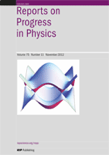
REPORTS ON PROGRESS IN PHYSICS
Scope & Guideline
Exploring significant developments in physics since 1934.
Introduction
Aims and Scopes
- Theoretical Physics:
The journal emphasizes theoretical frameworks and models that explain complex physical systems, including quantum mechanics, statistical mechanics, and field theory. - Experimental Physics:
A core focus on experimental studies that validate theoretical predictions or explore new phenomena, particularly in high-energy physics, condensed matter, and materials science. - Interdisciplinary Research:
The journal promotes interdisciplinary research that connects physics with other fields such as chemistry, biology, and engineering, fostering innovative approaches to solving scientific problems. - Emerging Technologies:
There is a strong interest in publishing research related to emerging technologies, including quantum computing, nanotechnology, and materials science, which have significant implications for both fundamental and applied physics. - Review and Survey Articles:
The journal publishes extensive review articles that synthesize current knowledge in specific areas of physics, providing valuable resources for researchers and students.
Trending and Emerging
- Quantum Information Science:
There is a significant uptick in research related to quantum information, including quantum computing, quantum communication, and entanglement, indicating a growing interest in harnessing quantum mechanics for technological applications. - Topological Phases of Matter:
Emerging studies on topological insulators and phases showcase a vibrant area of research that explores novel phenomena arising from quantum mechanics and symmetry, with implications for materials science and electronics. - Complex Systems and Non-Equilibrium Dynamics:
An increase in publications addressing complex systems, non-equilibrium dynamics, and active matter reflects a trend towards understanding collective behavior in various physical contexts, particularly in biological and soft matter physics. - Machine Learning in Physics:
The integration of machine learning techniques in the analysis and modeling of physical systems is increasingly prevalent, indicating a trend towards computational approaches that enhance research capabilities. - Quantum Materials and Nanotechnology:
Research focusing on quantum materials, including two-dimensional materials and their applications, is on the rise, showcasing the journal's commitment to advancing knowledge in cutting-edge technologies.
Declining or Waning
- Classical Mechanics:
There appears to be a decreasing number of studies focused solely on classical mechanics, as the field has become increasingly integrated with quantum and statistical mechanics. - Fundamental Particle Physics:
Research specifically dedicated to traditional fundamental particle physics, particularly topics that do not incorporate modern theoretical advancements or experimental techniques, seems to be less frequent. - Astrophysics and Cosmology:
Despite the journal's historical engagement with astrophysical topics, there has been a noticeable decline in the number of papers dedicated to conventional cosmological models, possibly due to a shift towards more innovative approaches in dark matter and energy studies. - Conventional Material Science:
Research focusing on conventional material science without incorporating advanced techniques or interdisciplinary approaches appears to be waning, as the field moves towards more complex systems and nanomaterials.
Similar Journals
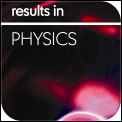
Results in Physics
Your Gateway to Cutting-Edge Physics DiscoveriesResults in Physics, an esteemed open-access journal published by ELSEVIER, has been a prominent platform for disseminating cutting-edge research in the field of physics since its establishment in 2011. With its ISSN 2211-3797 and E-ISSN 2211-3797, this journal proudly holds a Q2 ranking in the Physics and Astronomy category for 2023, showcasing its significance and quality within the scientific community. With a remarkable Scopus rank of #28 out of 243 in the general physics and astronomy domain, placing it within the 88th percentile, Results in Physics serves as a vital resource for researchers, professionals, and students alike, fostering a collaborative environment for the advancement of knowledge across various subfields. The journal aims to provide a rapid and unrestricted access to innovative findings, encouraging open scientific dialogue and enhancing the visibility of breakthrough research. Located in the Netherlands at RADARWEG 29, 1043 NX AMSTERDAM, Results in Physics continues to uphold its commitment to excellence and accessibility in the ever-evolving landscape of physics research.

REVIEWS IN MATHEMATICAL PHYSICS
Navigating the Dynamic Landscape of Mathematical PhysicsREVIEWS IN MATHEMATICAL PHYSICS is a premier scholarly journal published by WORLD SCIENTIFIC PUBL CO PTE LTD, focusing on the versatile and dynamic field of mathematical physics. Established in 1996, this journal has quickly become a pivotal resource for researchers and professionals seeking in-depth analyses and reviews of contemporary advancements in both mathematical and statistical physics. With an impressive categorization in Q2 for both Mathematical Physics and Statistical and Nonlinear Physics as of 2023, it ranks among the top in its field, boasting a Scopus Rank of #27 in Mathematical Physics and #29 in Statistical and Nonlinear Physics. While currently not available as an open-access platform, the journal remains valuable for its rigorous peer-reviewed articles that aim to bridge the gap between theoretical aspects and practical applications in physics. Given its significant influence—evidenced by a robust footprint in the academic community—REVIEWS IN MATHEMATICAL PHYSICS is essential reading for anyone dedicated to advancing their knowledge and understanding of complex physical phenomena.

Nature Reviews Physics
Illuminating the Path of Scientific Discovery.Nature Reviews Physics is a leading academic journal published by NATURE PORTFOLIO, specializing in the realm of physics and astronomy. With a significant impact factor that places it among the top-tier journals in its field, it has achieved a remarkable ranking of 3rd out of 243 according to Scopus, reflecting its influential position and 98th percentile standing in general physics and astronomy. This prestigious journal, with an expected convergence spanning from 2019 to 2024, provides comprehensive reviews that capture the latest advancements and critical developments in physics, deemed essential for researchers, professionals, and students alike. While the journal does not currently adopt an open-access model, its scholarly contributions and insights into cutting-edge research make it a vital resource for those seeking to advance their understanding of the complexities of the physical universe.

Romanian Journal of Physics
Exploring the universe through rigorous research.Welcome to the Romanian Journal of Physics, a distinguished platform dedicated to advancing the field of physics and astronomy since its inception. Published by EDITURA ACAD ROMANE, this journal plays a pivotal role in disseminating high-quality research from Romania and around the globe, with an impressive impact factor that reflects its rigorous academic standards. With a focus on a broad range of topics in general physics and astronomy, it proudly maintains a Q2 ranking in its category for 2023, positioning itself among the top journals in the field. The journal, which has been converging valuable research contributions from 2008 until 2024, is accessible to a wide audience of researchers, professionals, and students interested in the latest developments and discoveries in physics. While it operates under a traditional publication model without Open Access, its commitment to quality research ensures that the contributions featured in its pages resonate well within the scientific community. We invite you to explore the rich findings published in the Romanian Journal of Physics and to engage with the vital discussions shaping the future of physics.

CHINESE PHYSICS LETTERS
Where Cutting-Edge Research Meets Swift PublicationChinese Physics Letters is a prestigious journal published by IOP Publishing Ltd, based in the United Kingdom. Since its inception in 1984, the journal has served as a vital platform for disseminating impactful research in the field of physics, achieving a noteworthy Q1 ranking in the category of Physics and Astronomy (miscellaneous) as of 2023. Renowned for its rapid publication process, this journal is dedicated to providing a forum for high-quality, concise articles that address innovative theoretical and experimental findings relevant to both the academic community and industry practitioners. With an impressive Scopus rank of #52 out of 243, placing it in the 78th percentile, Chinese Physics Letters continues to influence the global physics landscape. Researchers, professionals, and students alike find this journal indispensable for staying abreast of the latest developments and trends in physics.

Annual Review of Condensed Matter Physics
Connecting Academia and Industry through Insightful ReviewsThe Annual Review of Condensed Matter Physics, published by Annual Reviews, is a leading journal dedicated to advancing understanding in the field of condensed matter physics and materials science. With an impact factor that reflects its esteemed position—ranking in the top quartile (Q1) across both condensed matter physics and miscellaneous materials science categories—this journal serves as a crucial resource for researchers and professionals seeking the latest insights and comprehensive reviews in these dynamic areas of study. The journal spans an impressive range of topics from theoretical developments to applied research, aiming to create a rich dialogue among academia and industry. With consistent publication from 2010 to 2024, it curates high-quality, peer-reviewed articles that set a benchmark for excellence in the scientific community. Engaging both established professionals and emerging scholars, the Annual Review of Condensed Matter Physics is pivotal in shaping the discourse and fostering innovation in condensed matter research.
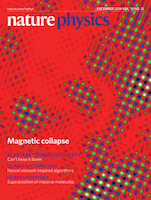
Nature Physics
Elevating Physics Research to New HeightsNature Physics is a premier journal dedicated to publishing high-impact research in the realm of physics, brought to you by the esteemed NATURE PORTFOLIO. With its ISSN 1745-2473 and E-ISSN 1745-2481, this journal has established itself as a vital resource for the physics community, enjoying a remarkable Q1 quartile ranking in the Physics and Astronomy category for 2023 and securing an impressive Rank #5/243 and a 98th percentile ranking in Scopus. Since its inception in 2005, Nature Physics has become a catalyst for innovation, featuring cutting-edge research that encompasses a broad spectrum of physics disciplines. Although it operates under traditional subscription models, it maintains a commitment to accessibility through selective publications and editorial excellence. Positioned in Berlin, Germany, this journal is a must-read for researchers, professionals, and students who seek to stay at the forefront of advancements in physics.
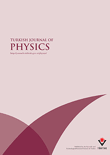
Turkish Journal of Physics
Exploring the depths of physics and astronomy.Turkish Journal of Physics, established in 1994 and published by the Tubitak Scientific & Technological Research Council Turkey, is a prominent platform for the dissemination of innovative research in the field of physics and related areas. With an ISSN of 1300-0101 and an E-ISSN of 1303-6122, this journal has carved a niche in the academic community, evidenced by its ranking within the Q3 category in the 2023 evaluation of Physics and Astronomy. As it converges its published works toward the year 2024, researchers and scholars are encouraged to engage with its rich repertoire of studies that covers general physics and astronomy, currently holding a Scopus rank of #96 out of 243, placing it in the top 60th percentile. The Turkish Journal of Physics serves as a vital resource for advancing knowledge, fostering collaborative research, and providing insights into contemporary advancements in the discipline. While it operates under a subscription model, the quality and impact of its peer-reviewed articles make it an essential read for professionals and students alike, looking to stay informed on critical developments within the physics community.

PHYSICAL REVIEW LETTERS
Setting the Standard for Rigorous Physics ScholarshipPhysical Review Letters, published by the American Physical Society, is a premier journal in the field of Physics and Astronomy renowned for its rapid dissemination of high-impact research findings. With a distinguished history dating back to 1958 and an impressive ranking of #13 out of 243 in the general physics category, it stands proudly within the Q1 quartile, placing it in the top 6% of journals in its field. The journal focuses on brief reports of significant fundamental research across all areas of physics, making it an essential resource for researchers, professionals, and students seeking to stay at the forefront of developments in their field. Although Physical Review Letters does not offer open access options, its rigorous peer-review process ensures a high standard of quality and relevance in its published articles. With an unwavering commitment to advancing the understanding of physical science, this journal is indispensable for those looking to make a genuine impact in their research endeavors.
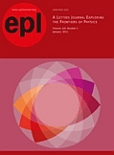
EPL
Innovative Insights, Transformative DiscoveriesEPL, a prominent journal published by IOP Publishing Ltd, stands at the forefront of the field of Physics and Astronomy. With a history of impactful contributions stretching from 1986 to 2024, EPL serves as a dynamic platform for researchers to disseminate their pioneering findings and innovative ideas. The journal, with a current category ranking of Q2 among its peers and a competitive Scopus rank of #101 out of 243 in the general physics and astronomy category, reflects its substantial reputation and contribution to the scientific community. Although it operates under a traditional subscription model, EPL's reach is extensive, enabling access to a diverse readership that includes academicians, industry professionals, and students alike. By fostering interdisciplinary collaboration and promoting rigorous research, EPL continues to play a vital role in shaping the future of physics and astronomy.